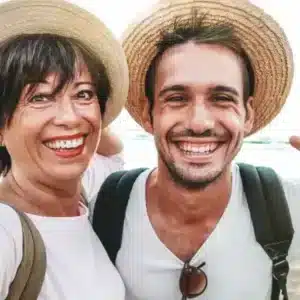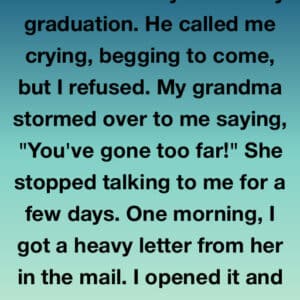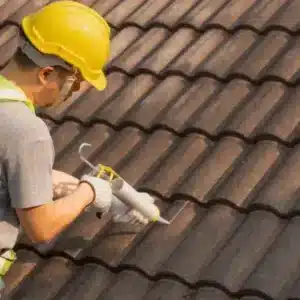Being a flight attendant, I’ve seen it all—or so I thought. That day had started off like any other. The safety demo, the smiles, the slow drift of passengers settling into their books or screens. But somewhere between handing out sparkling water and preparing for meal service, I heard it.
A soft sound—almost like a kitten mewing—coming from the lavatory mid-cabin.
I paused. No one had reported an emotional support animal. Curious and mildly concerned, I knocked gently. “Hello? Is everything alright?”
Silence.
I hesitated, then opened the door.
What I found wasn’t a lost cat. Curled up on the floor, clutching a crumpled paper bag, was a little boy. Tears streaked his face, his shoulders trembled. My heart stuttered.
“Whoa—hey there, buddy. You scared me,” I said, squatting down slowly. “I’m Leslie. What’s your name?”
“Ben,” he whispered.
I helped him up and guided him to the jump seat. He looked no older than eight. And when I checked the passenger list—no Ben. Not even close.
No adult with the same last name. No unaccompanied minor paperwork. Nothing.
I sat down beside him, keeping my voice light. “Did you come with someone? Your mom or dad?”
Ben said nothing. He just clutched that paper bag like it held his whole world.
Across the aisle, my coworker Carmen caught my eye. “Everything okay?” she mouthed.
I shook my head slightly. “Not yet.”
I tried again. “Do you remember getting on the plane, Ben?”
A small shake of the head. No.
He wore shorts and a faded blue T-shirt. No jacket. No bag, no ID—just that worn paper bag.
I guided him gently toward the galley in the back, promising juice and a warm blanket. He followed, quietly, wiping his nose on his sleeve.
Carmen handed him crackers and apple juice. He accepted them slowly, cautiously, as if unsure if it was really for him.
“Ben,” I asked softly, “do you remember who brought you to the airport?”
His face tightened. His fingers crushed the paper bag.
After a long silence, he finally spoke. “Mama told me to go. She said to find my Aunt Margo.”
Carmen and I exchanged a glance. No Margo on the passenger list either.
“Do you know your aunt’s last name?” Carmen asked.
He shook his head. “We just call her Aunt Margo.”
That bag he held? It contained a single stuffed bear—missing one eye—and a folded letter in cursive.
He finally asked, “Can I open it now?”
“Of course,” I told him.
He read it in silence, lips quivering. Then he handed it to me.
His mother had written it before putting him on the plane. She explained that she was very sick. That she couldn’t take care of him anymore. That Margo—his aunt in Los Angeles—might give him a better life.
It was heartbreaking. Short, desperate, but full of love. She’d done this because she truly thought it was the only way.
I could barely breathe as I read it. Carmen wiped her eyes.
We notified Captain Baker. A seasoned pilot, he’d seen plenty—but not this. “We’ll contact the ground,” he said. “Child services will be waiting. Just keep him calm.”
We continued the flight as smoothly as possible. Ben stayed in the galley, tucked under a blanket, crackers in one hand, the bear in the other. I told him about my childhood, how I’d always looked up at the sky and wondered where planes were headed.
“You did?” he asked, almost smiling.
“I became a flight attendant just for that,” I said. “And because sometimes I get to meet brave kids like you.”
We landed. And waiting at the gate were a police officer and a kind-eyed social worker named Ms. Delgado.
Ben clung to me. “I’m scared.”
“I know,” I said, squeezing his hand. “But you’re not alone now.”
Before stepping off, Carmen pinned a pair of flight crew wings to his shirt. “You’re one of us now,” she told him.
He smiled, barely.
Then he hugged me—tight. “Thank you,” he whispered. “And thanks for the crackers, too.”
After that, I should’ve let it go. Should’ve let the system take over. But I couldn’t stop thinking about him.
So, I searched.
After a dozen dead ends, I found a gallery in Los Angeles. An artist named Margaret Evers. Seascapes. Beaches. Margo.
I emailed. A vague message. Just enough.
And then: “This is Margaret Evers. You mentioned Ben. Please call me.”
We spoke. She was stunned. Her sister hadn’t told her anything. She was heartbroken, but ready—eager—to help.
Over the next few weeks, paperwork, home visits, and interviews followed. Margo passed every test. She wanted Ben, and she was ready to give him the life his mother had hoped for.
Then, one day, she called me. “He’s here.”
My heart flooded with relief.
Later, during a stopover in L.A., she invited me to visit.
When the door opened, Ben was there—same bear in hand, smile wide.
“Leslie!”
He barreled into me like a tiny rocket.
He was okay.
Inside the cozy home, the walls were filled with art—waves, skies, one painting of two figures at sunset. Ben showed me his crayons, his new favorite snack, and told me Margo let him paint.
Before I left, he slipped a folded paper into my palm. “Open it later,” he whispered.
In my hotel room that night, I unfolded it.
A crayon drawing of a plane. A figure—me—with a huge grin. A boy beside me, labeled “Ben.” At the bottom:
“Thank you for not giving up on me.”
I held the paper to my chest and cried.
Because sometimes, all it takes is one moment—one small act of kindness—to change someone’s world. I didn’t do anything special. I just listened. Cared. Stayed.
And in doing so, I helped a little boy find his way home.





